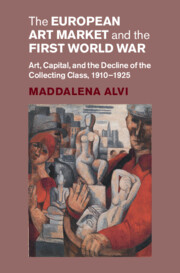 The European Art Market and the First World War
The European Art Market and the First World War Published online by Cambridge University Press: 10 April 2025
Parallel to Chapter 2, this section reconstructs the socio-economic history of the art market after the First World War. The immediate postwar year, marked by political and economic instability, posed unique challenges for the losers of the war. Germany, in particular, faced hyperinflation, a phenomenon that contributed to accelerate changes initiated by the war. In contrast, the stagnation of the French art market was aggravated after 1918 due to nationalisation, bureaucratisation, and new distribution patterns that only cemented its isolation. Meanwhile, the British market remained relatively stable and less reliant on foreign buyers. The rise of neutral parties’ purchasing power, notably in Switzerland, Sweden, and the Netherlands, highlighted the new dynamics of a fragmented market. Overall, the war altered the trade dynamics of the European art market, with uncontrollable expansion in Germany, French decline, and British stability reflecting its economic impact.
To save this book to your Kindle, first ensure [email protected] is added to your Approved Personal Document E-mail List under your Personal Document Settings on the Manage Your Content and Devices page of your Amazon account. Then enter the ‘name’ part of your Kindle email address below. Find out more about saving to your Kindle.
Note you can select to save to either the @free.kindle.com or @kindle.com variations. ‘@free.kindle.com’ emails are free but can only be saved to your device when it is connected to wi-fi. ‘@kindle.com’ emails can be delivered even when you are not connected to wi-fi, but note that service fees apply.
Find out more about the Kindle Personal Document Service.
To save content items to your account, please confirm that you agree to abide by our usage policies. If this is the first time you use this feature, you will be asked to authorise Cambridge Core to connect with your account. Find out more about saving content to Dropbox.
To save content items to your account, please confirm that you agree to abide by our usage policies. If this is the first time you use this feature, you will be asked to authorise Cambridge Core to connect with your account. Find out more about saving content to Google Drive.